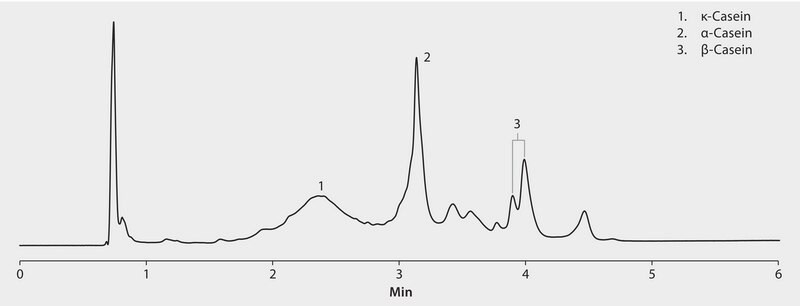HPLC Analysis of Caseins on BIOshell A400 Protein C4

Materials
analytical column
CONDITIONS
column
BIOshell A400 Protein C4, 10 cm x 2.1 mm I. D., 3.4 μm particles (66825-U)
mobile phase
[A] 80:20 Water (0.1% trifluoroacetic acid): Acetonitrile (0.1% trifluoroacetic acid); [B] 20:80 Water (0.1% trifluoroacetic acid): Acetonitrile (0.1% trifluoroacetic acid)
gradient
20 to 53% B in 5 min
flow rate
0.3 mL/min
pressure
1150 psi (79 bar)
column temp.
50 °C
detector
UV, 215 nm
injection
10 μL
sample
Three component casein mix, 200 μg/mL, 0.1% trifluoroacetic acid
Description
Analysis Note
Caseins are a group of phosphoproteins found predominantly in mammalian milk. Each type of mammalian milk has a different profile of caseins (alpha, beta, etc.) based on the mammal′s diet and where it is located. Therefore, this profile can be used to authenticate where certain dairy products (i.e. cheeses) came from. A RP-HPLC method for the separation of three caseins (alpha, beta, and kappa-casein) was developed on the BIOshell A400 Protein C4 column.
Other Notes
Due to the heterogeneity of the standards, band broadening and extra peaks resulted in the chromatogram.
Two isoforms of beta-casein exist in mammalian milk: A1-beta-casein and A2-beta-casein; therefore, two peaks are identified for beta-casein.
Legal Information
null